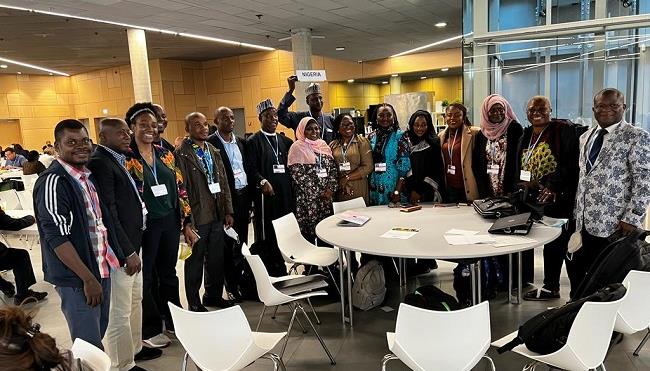With the world now shifting its attention toward turning the promises of the Paris Agreement into reality, countries are being called upon to come forward with strengthened climate plans that boost both their ambition and real-world action. This was one focus of the UN Climate Change Conference in Bonn that held from June 6 to 16, 2022.

Countries urgently need to strengthen their national climate plans, known as nationally determined contributions (NDCs), which will be captured in a new synthesis report, compiled by the UN Climate Change Secretariat, later this year.
Last year’s NDC Synthesis Report – a compilation of all national climate action plans submitted so far – warned that the world is still far off course to achieve the Paris Agreement goal of stabilising global temperature rise at 1.5 degrees Celsius by the end of this century.
Instead, the report showed current commitments to cut greenhouse gas emissions put the planet on track for close to 2.7 degrees Celsius temperature rise by the end of the century. Limiting temperature rise to 1.5 degrees Celsius is essential to avoid the worst impacts of climate change, including more frequent and severe droughts, heatwaves and rainfall.
The Intergovernmental Panel on Climate Change (IPCC) has estimated that meeting this temperature goal requires cutting global greenhouse gas emissions 45% by 2030.
Several developing countries eagerly shared their experiences in Bonn
With that urgency in mind, a series of special events were held at the Bonn Climate Change Conference to help accelerate the implementation of national climate plans. UN Climate Change, in collaboration with the NDC Partnership, organised an event at the conference that brought countries and development organisations together to discuss their first-hand experiences when it comes to implementing climate plans.
The importance of financial support as the main factor to jump-start NDC implementation was highlighted by several participants. Chandra Shekhar Sinha, Climate Advisor with the World Bank, noted that their financing is increasingly being aligned with NDCs and that planning for NDC implementation is now a core part of their work.
Specifically developing countries were invited to show case their climate action at the event, and several were keen to do so. Speaking at the event, Margaret Athieno Mwebesa, Climate Change Commissioner with Uganda’s Ministry of Water and Environment, said the country has already updated its NDC and it regularly reviews where it stands in terms of on-the-ground climate action.
The plan looks at where the highest demand is in different sectors of its economy and mobilises its resources accordingly. In addition, Uganda’s Ministry of Finance is now creating a climate change unit – to quickly mobilise funding for climate action.
Milagros Sandoval, the General Director of Climate Change and Desertification with the Government of Peru, explained the country is focusing on public participation to ensure the success of its NDC. Peru has designed three specific spaces where multi-stakeholder consultations take place, including a high-level commission on climate change, a national-level commission on climate change to involve civil society and an Indigenous peoples’ platform.
Long-term climate plans also in the focus at June climate conference
A second event, also organised by UN Climate Change, looked at the experience of so-called long-term low greenhouse gas emission development strategies (LT-LEDS). While the NDC process focuses on short-term, urgent climate action, the LT-LEDS process focuses on long-term climate strategies. Despite this key difference, both processes are closely linked. For example, ambitious targets in long-term climate plans can help inform specific action in short-term plans.
The LT-LEDS event at the Bonn Climate Change Conference underlined the benefits, opportunities and challenges based on the direct experience of four developing countries (Cambodia, Nigeria, Morocco, Uruguay) that submitted LT-LEDS last year.
Bouzekri Razi, Director for Climate Change, Biodiversity and Green Economy with the Government of Morocco’s Ministry of Energy Transition and Sustainable Development, said his country is positioning itself as a leader in transiting to a green economy as a way to improve its economic competitiveness. By developing LT-LEDS, Morocco aims to attract foreign investment since more investors are seeking a framework to align their investments with sustainable development.
Iniobong Abiola-Awe, Director of the Department of Climate Change in Nigeria’s Federal Ministry of Environment, said one of the most difficult challenges is bringing different ministries together to address climate change. She said the country’s LT-LEDS process has resulted in several ministries together to develop climate strategy for the first time.
What’s next
- The Glasgow Climate Pact, agreed to at the UN Climate Change Conference (COP 26) last year, requests that all countries “revisit and strengthen” their NDCs by the end of 2022.
- The Glasgow Climate Pact also requested countries to submit LT-LEDS that will help meet the goal of transitioning to net-zero emissions by or around mid-century.
- The Glasgow Climate Pact further includes a new “work programme” to “urgently scale up mitigation ambition and implementation.”
- So far, 13 countries have submitted new or updated NDCs since COP26.
- UN Climate Change will release a new NDC synthesis report later this year.
- UN Climate Change will also release an LT-LEDS synthesis report this year.
